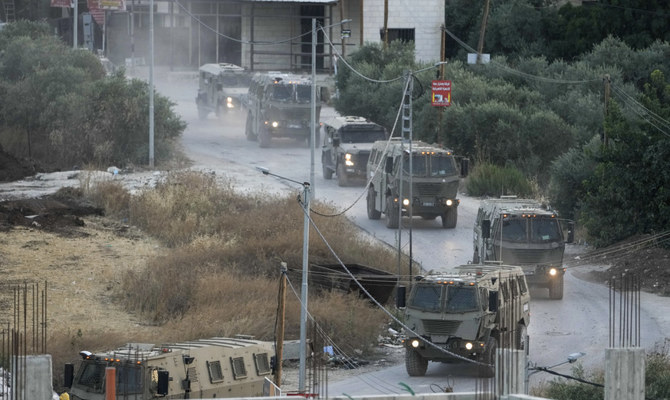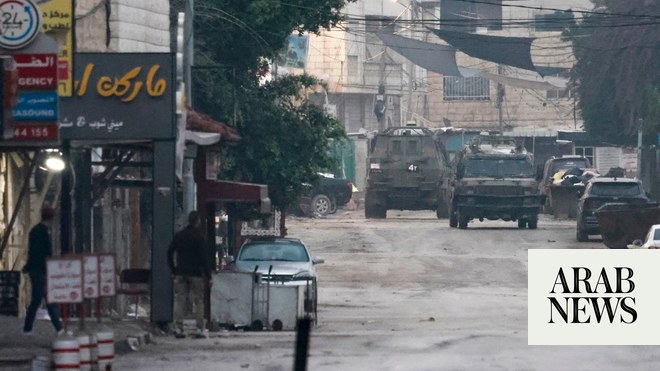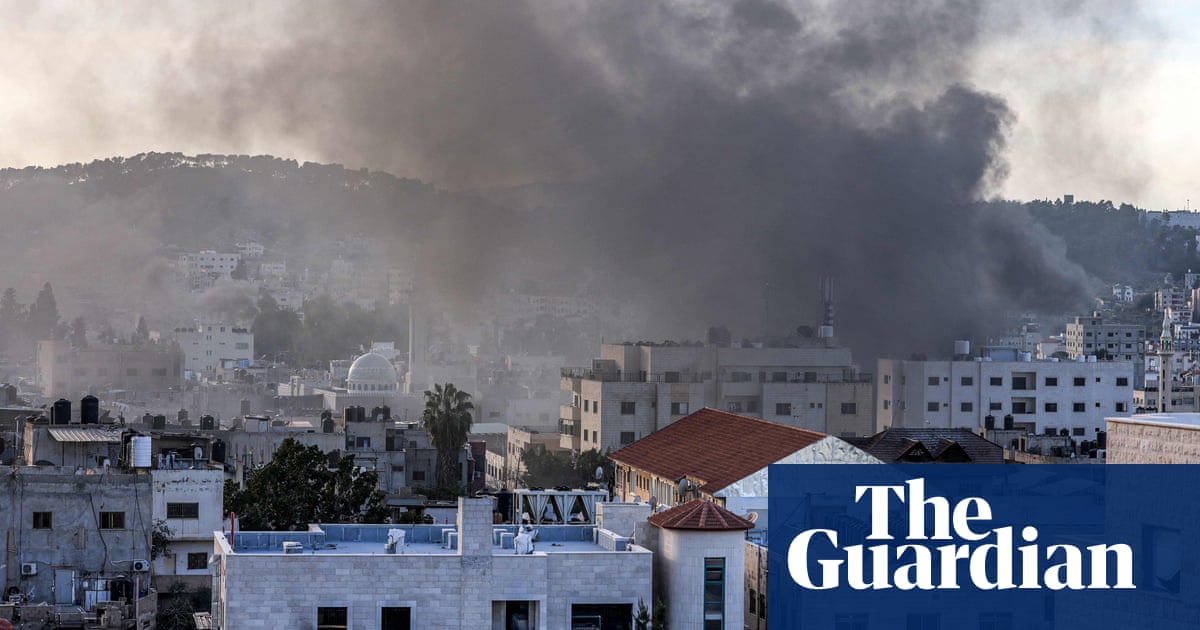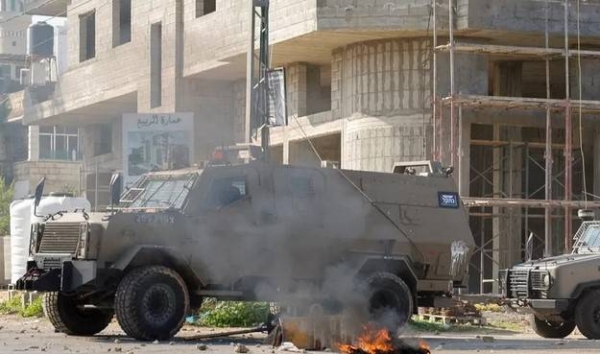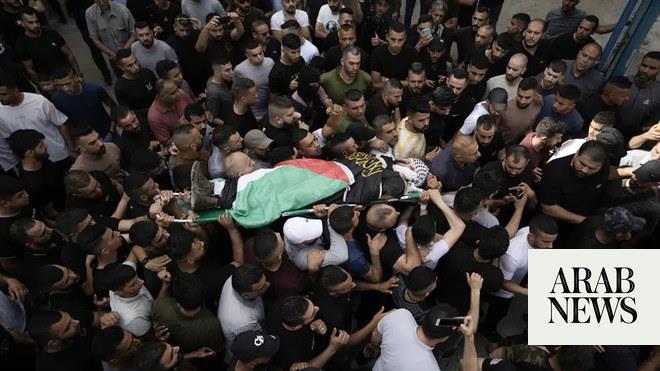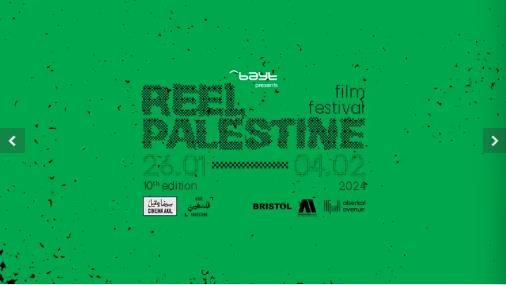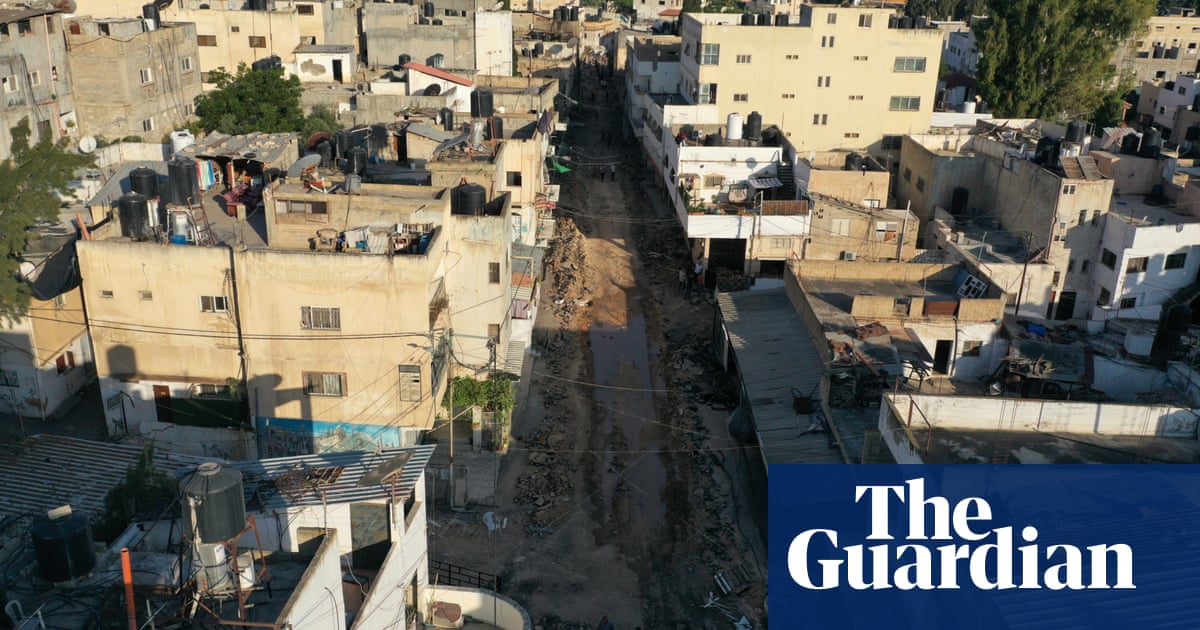
On the second floor of the Shibli family home in the Jenin refugee camp, three small boys knelt on the tile floor, picking up hundreds of spent bullet casings left by Israeli snipers who had used their kitchen as a firing position. The cartridges clinked and chimed gently as the children cleared up and their glum parents surveyed the extent of the damage inflicted on their property.
The 50 members of the extended family, who all live in flats in the same large building, returned to their homes on Wednesday morning after Israeli forces withdrew the night before. The three-day operation, codenamed Home and Garden, was the largest Israeli offensive in the occupied West Bank in two decades, involving airstrikes and up to 2,000 ground troops.
“The soldiers forced everyone into one room while they searched the house. Then they made us go outside, and they used a shoulder-launched rocket to fire into the house. There were no resistance youths here,” said the family patriarch, Hussein, 68.
A total of 12 Palestinians, at least four of whom were combatants, and one Israeli soldier were killed in the intense fighting, which the army said targeted an important militant command centre in the slum-like neighbourhood of Jenin city.
On the second day of Home and Garden, another nine people were wounded in Tel Aviv after a Palestinian attacker ran down pedestrians with his car and stabbed people. In Jenin, the Israel Defence Forces (IDF) denied accusations that soldiers had shot and injured people gathered in the courtyard of a hospital, although the hospital director confirmed to the Guardian the incident had taken place, and four people had been injured by live ammunition.
The violence spiralled further still overnight on Tuesday when five rockets were launched from the blockaded Gaza Strip. All of the fire was intercepted, and Israel responded by striking what it said were two weapons-making sites operated by the Hamas militant group.
By dawn on Wednesday, the situation appeared to have calmed. In the early morning cool, Jenin’s residents extinguished the smoking remains of tyre fires and knocked out the remaining shards of glass in broken window frames as the long process of rebuilding and repairing began.
Israeli forces did not manage to penetrate the heart of the camp, but the destruction caused by Home and Garden is still on a scale more reminiscent of fighting in the Gaza Strip than the West Bank – and not witnessed in Jenin since 2002, during the height of the second intifada, or Palestinian uprising.
Both Israelis and Palestinians are aware there has been growing pressure on the army from Israel’s right wing to launch a large operation as a response to the bloodiest year in Israel and the West Bank since 2005: 140 Palestinians and 26 Israelis have been killed so far in 2023, mostly in IDF raids and Palestinian terrorist attacks.
Home and Garden is a portent of the city’s future, and that of other restive areas of the West Bank, such as Nablus, if this new chapter of violence continues to spiral.
On Wednesday, most of the 3,000 to 4,000 people who fled the 1km sq densely populated camp during a lull in the fighting on Monday night picked their way home through rubble and debris, many still numb with shock. “Thank God we have some water left,” said Umm Fatiyeh Asadi, 69, a widow living alone near the camp’s main entrance.
“I lived in Saudi Arabia for 20 years, working as a teacher. When my husband and I came back to Palestine, we thought life would be better. But what happened, the destruction, is just like the intifada.”
The civil defence team at Jenin’s fire station, who for days sat outside their headquarters waiting for something to do, sprang into action, coordinating construction equipment to clear roads and surveying damaged homes. Cherrypicker trucks lifted electricians to inspect broken cables and a bulldozer picked up the skeleton of a burnt-out van, expertly manoeuvring it between parked cars and into an empty lot.
Ala Ghazawi, 34, was standing outside what used to be his white goods repair business before it was blown up by IDF soldiers on Monday. The washing machines and fridges, blackened by fire damage, had been thrown out of the two-storey building into the street.
His neighbour, Jamil Shadi, 66, was cleaning up the broken glass in his daughter’s beauty salon. The heat of the explosion was so intense the plastic flower pots outside had melted, leaving neon green and pink puddles on the concrete. “On a personal level, this is much worse for our family than 2002,” he said.
As the morning wore on, and masked men carrying M-16s and pistols began to arrive before the funeral processions for killed fighters at 1pm, the mood in the camp began to turn from distress to anger.
The first of the dead, a young man wrapped in a Palestinian flag, with his grey face exposed, was carried through the streets of the camp and Jenin centre on the shoulders of his comrades, themselves wearing insignia and waving flags of many different armed factions, including the Palestinian Authority’s ruling Fatah party’s armed wing, the al-Aqsa Brigades, Palestinian Islamic Jihad, and the Marxist Popular Front for the Liberation of Palestine.
Gunfire rang out as thousands of young men chanted: “Rest assured, martyr, we will continue your struggle.”
In an extraordinary incident, when senior members of the semi-autonomous Palestinian Authority (PA) arrived to pay their respects – including Mahmoud Aloul, a close ally of the president, Mahmoud Abbas – they were booed and chased away by the mourners.
“The PA is no help to us. They let this happen and did not defend the camp … They are in the Israelis’ pocket,” said Ghazawi, the shopkeeper.
Maj Nir Dinar, a spokesperson for the IDF, said the army considered the operation a success, having made about 120 arrests and seized large amounts of guns, materials for making explosives, ammunition and cash. “The operation minimises the possibility we will see more terror in the future. Peace won’t come tomorrow though. It’s the terrorists’ decision: if they keep doing attacks, there will be more raids.”
Most people in Jenin the Guardian spoke to on Wednesday also expected more violence.
“My daughter is wearing a T-shirt commemorating the 2002 incursion,” said Fadi Shibli, 33, as he stood in the ruins of his apartment holding his six-year-old, Maha. “Now she is living through the same thing I did.”





